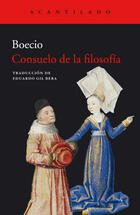Throughout the millennium that separates the end of Antiquity from the Renaissance, Boethius' authority was such that it could only be compared with that of Aristotle and Augustine of Hippo. This celebrity was due, above all, to his last work, the Consolation of Philosophy, written while awaiting his execution in the Pavia prison, which elevated him to the category of exemplary scholar. The text not only shows what philosophy can offer the individual in moral terms, but is also an extraordinary compendium of the doctrines of the classical philosophers—Plato, Aristotle, Seneca, Virgil, Horace, Cicero, Ovid, Plutarch and Juvenal— for whom wisdom consisted in leading a kind, dignified and respectable life. A work whose influence lasted, beyond philosophy, in the works of great writers such as Chaucer, Boccaccio and Dante.
Shopping cart
Loading cart
Important notices
|
|
Recordando a André Rouillé: Su legado en la fotografía André Rouillé 1948 - 2025 |
|
|
Libros de filosofía y co. Disponibles en Librería Herder |
|
|
Revista Filosofía & Co. nº 9 Nueva revista de filosofia divulgativa y actualidad |
|
|
"Espacios de la filosofía" - Mauricio Beuchot - Novedad Herder México |
|
|
Revista Filosofía & Co. nº 8 Nueva revista de filosofia divulgativa y actualidad |
Pay safely with:


In the webshop
New
|
|
Regresar afuera 70148 $275.00 -0.00% $275.00 |
|
|
La instauración filosófica 70142 $570.00 -20.00% $456.00 |
|
|
El bestiario de Michel Foucault 70404 $749.00 -15.00% $636.65 |
|
|
La fuerza de los fuertes 70405 $519.00 -15.00% $441.15 |
|
|
Su Majestad 70410 $319.00 -15.00% $271.15 |
In the press
Promotions
|
|
El Gobierno de las emociones 65449 $965.00 -60.00% $386.00 |
|
|
Prosa y poesía. Homenaje a Gonzalo Sobeja 70242 $1,755.00 -25.00% $1,316.25 |
|
|
Lingüística española aplicada a la terapia del lenguaje 70239 $300.00 -25.00% $225.00 |
|
|
Introducción a la filosofía 70243 $620.00 -25.00% $465.00 |
|
|
El tratamiento de los niños autistas 70240 $675.00 -25.00% $506.25 |







